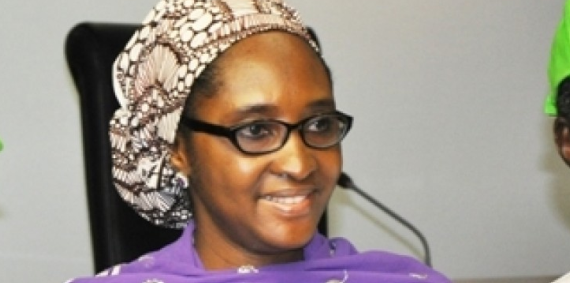Minister of Finance, Mrs. Zainab Shamsuna Ahmed has said the Federal government is targeting to create about 1.4 million jobs in the Cotton, Textile and Garment sector within the next few years.
The minister, who spoke over the weekend at an interactive session with some editors in Lagos, lamented the decline in the once robust sector, but assured that the government has in place a policy that is aimed at “improving the capacity of production, marketing and competitiveness of players across the entire value chain in the sector to create jobs and wealth for Nigerians.”
She said: “Nigeria’s Cotton, Textiles & Garments, CTG, sector has been on a serious decline from the 1960s till date: There were 51 ginneries in Nigeria during the 1960s-1970s. Today there are only 10 ginneries with 650,000MT capacity but only 10% utilization. In the 1980s the textile industry provided 350,000 direct jobs. Now only 51,000 people are employed by this sector. From having 176 textile mills in the 1990s, there are now only 34 mills with only 35% utilization.”
According to Mrs. Ahmed, the policy put in place by the government in 2015 has not yielded the expected outcomes due to issues in the sector such “as insufficient cotton seeds, inadequate infrastructure, and smuggling, counterfeiting and dumping.”
She however, assured that the policy had been reviewed to address the issues.
Based on the current policy, she said the government’s targets for the sector are: to create 100,000 direct jobs and 1.3 million indirect jobs; increase local cotton seed production to 500,000MT, increase foreign earnings to at least $3 billion annually, increase foreign exchange as well as foreign direct investment.
Also speaking on the objectives of the government’s Cassava Policy, the minister said the target was to create about 500, 000 jobs, increase local production of cassava starch from 38,000 to 1,473, 000MT, increase cassava for industrial use from 0.4 million to more than 9 million tubers in the next four years.
The minister lamented that though Cassava is the most widely cultivated crop in Nigeria, grown in most states of the country and accounting for about 20% of global production, Nigeria still accounts for less than 5% of global exports of cassava and its products.
In the area of rice production, Ahmed noted that Nigeria has achieved self sufficiency.
She said; “In rice production, we are self sufficient. We don’t have to import any rice, anybody who still chooses to eat imported rice, it’s because of their taste, but we have enough rice in the country.”
On the quality of the home grown rice, the minister said; “It is of the highest quality you can think of, very high standard. Remember that some of the rice that comes from Taiwan and India have been in their stores for so many years and they won’t feed their animals on it, yet they bring it here.”
Besides achieving self sufficiency in rice, the minister also said a lot of progress has been made in tomatoes, wheat and fertilizer production.
Mrs. Ahmed also responded to a question on what the government has done with the Abacha loot and all the recovered money, explaining that the monies are being used to fund the budget.
Specifically on the Abacha loot, which was earmarked to be given to the poor, the minister said; “That programme is ongoing, we are using the money for the conditional cash transfer programme, that is a programme that is giving N5000 per month to the poorest of the poor.
“The programme has kicked off very well. The social register now has about 24 states and while we’re paying the registered ones, we’re still registering. I believe so far there are about one million on the register but not up to that already on the scheme paying. However, the idea is that for every local government you have beneficiaries.”
The minister also touched on other social programmes of the federal government even as she noted that Nigeria has the fastest growing social programme in the world.
She disclosed that the government through the Government Enterprise and Empowerment Programme, GEEP, has disbursed ₦28.63 billion to a total of 1,517,030 beneficiaries.
READ ALSO: Points for Concern and Action
She explained that GEEP was one of the programmes under the Federal Government’s National Social Investment Programme, “which is aimed at providing microcredit facilities at 0% interest rate to micro-enterprises such as market women, traders, artisans, farmers, agricultural workers etc.”
According to her, the government, working with the Bank of Industry, was able to disburse the said amount to the beneficiaries, which breakdown based on its two flagship products, she gave as: TraderMoni; ₦11.85 billion disbursed to 1,185,290 beneficiaries and MarketMoni through which ₦16.78 billion has been disbursed to 331,740 beneficiaries.
TraderMoni was introduced to cater to micro-businesses across value chain clusters – motorcycle riders, food vendors and petty traders while MarketMoni was created to provide financial aid for the under-banked and unbanked by ensuring access to easy and quick loans at no interest rate.
Another intervention programme of the government which the minister presented was the Financial Intervention to MSMEs. According to her, between January 2015 and December 2018, the Bank of Industry disbursed a total of ₦516.68 billion to 13,734 large, medium and small as well as microenterprises cutting across several core and emerging sectors of the Nigerian real sector i.e. Agro-processing (food and non-food based), Solid Minerals, Healthcare, Creative Industry, Engineering, Technology, Petrochemicals, Women-businesses among others.
Ahmed explained that the Bank’s activities over the past 4 years have facilitated the creation of an estimated 2 million direct and indirect jobs.











